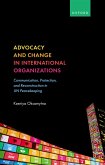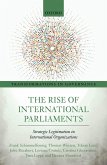How do international organizations in the United Nations system put together their budgets? What is the role of complex principals - most notably member states - and the complex agents in the bureaucracies of international organizations in budgeting processes? And what does a focus on budgeting tell us about the changing nature of the system of international organizations? This book provides answers to these questions through a detailed examination of budgeting in the UN system. The analysis draws on both quantitative and qualitative observations for a total of 22 UN system organizations and detailed case studies for the United Nations, ILO, UNESCO, and WHO. The findings demonstrate the importance of three key organizational outcomes-- proceduralization, routinization, and budgetary segmentation - as international organizations grapple with managing discord over priorities as a result of complex principal-- agent constellations. Contrary to a common view of international bureaucracies as pathological organizations, core budget routines are mostly successfully maintained. However, principal constellations become more complex, notably through the rise of voluntary contributions and non-state donors; budgetary segmentation advances, in some cases even leading to the setting up of new international organizations; and budgeting and resource mobilization become ever more intertwined. As a consequence, the capacity of international bureaucracies to fulfil their budgeting responsibilities is stretched to the limits and beyond. Transformations in Governance is a major academic book series from Oxford University Press. It is designed to accommodate the impressive growth of research in comparative politics, international relations, public policy, federalism, and environmental and urban studies concerned with the dispersion of authority from central states to supranational institutions, subnational governments, and public-private networks. It brings together work that advances our understanding of the organization, causes, and consequences of multilevel and complex governance. The series is selective, containing annually a small number of books of exceptionally high quality by leading and emerging scholars. The series is edited by Liesbet Hooghe and Gary Marks of the University of North Carolina, Chapel Hill, and Walter Mattli of the University of Oxford.
Dieser Download kann aus rechtlichen Gründen nur mit Rechnungsadresse in A, B, BG, CY, CZ, D, DK, EW, E, FIN, F, GR, HR, H, IRL, I, LT, L, LR, M, NL, PL, P, R, S, SLO, SK ausgeliefert werden.









